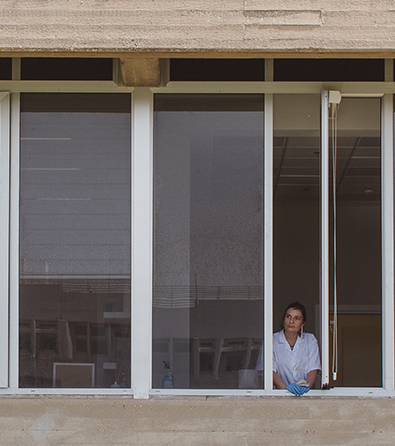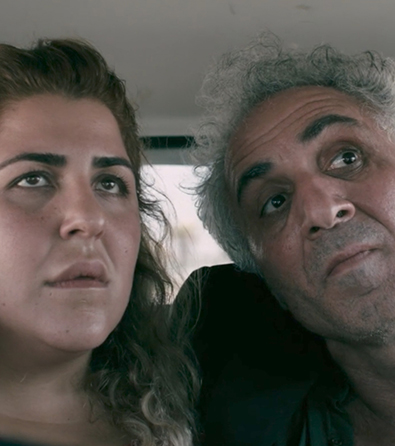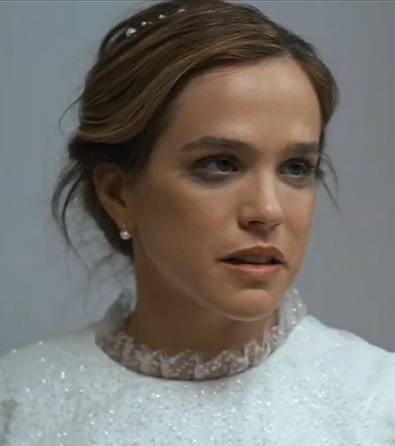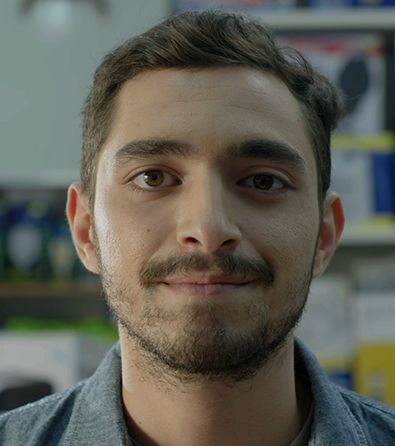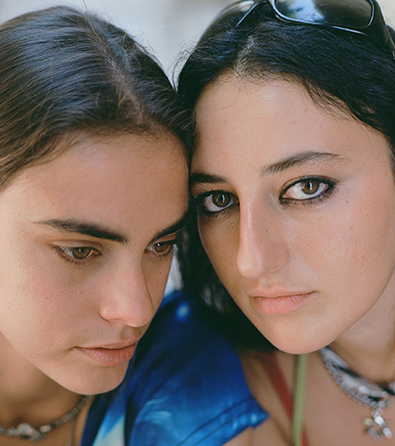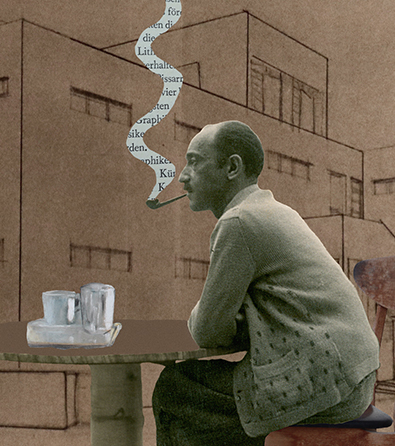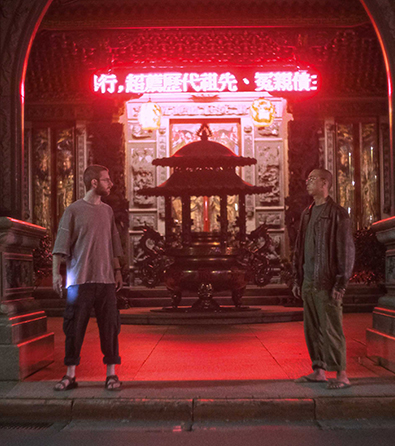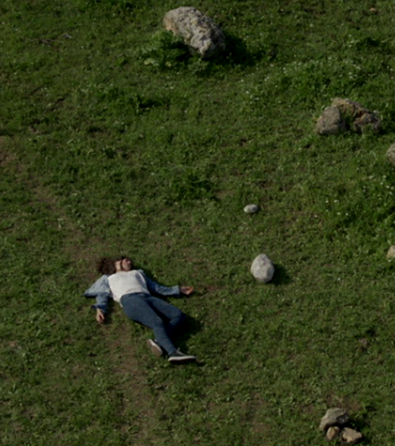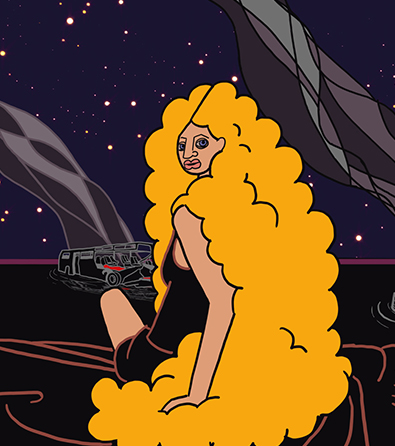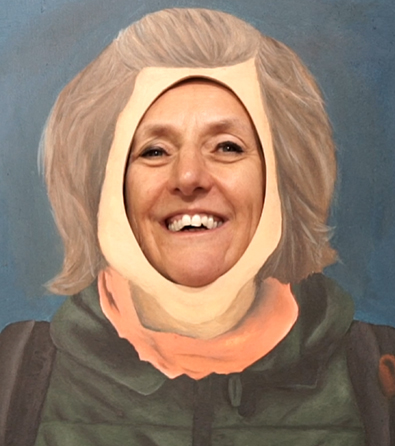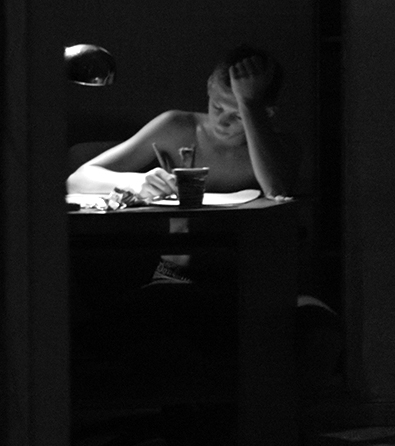The short film Ruso (18 minutes) is available at the top of the page.
* To watch this film, please approve YouTube/Vimeo cookies via the blue cookie icon at the bottom left of the screen.
Anyone who has followed the creative path of filmmaker Eti Tsicko over the past fifteen years was unlikely to be surprised when her debut feature film Nandauri (2025) won five Ophir Awards, including the prestigious Best Director prize. Tsicko has emerged as one of the most distinctive and resonant voices in contemporary Israeli cinema. Long before Nandauri, a succession of short films had already revealed her mastery of a deeply expressive cinematic language, rich in emotion, nuance, and tension, and her ability to direct actors whose performances seem to restrain an immense, unseen force rising from within.
Ruso (2021) is the last short film directed by Tsicko before Nandauri. It was nominated for an Ophir Award and earned Tsicko the Promising Director Award at the Tel Aviv International Student Film Festival. Like many of her other films, including Nandauri, Ruso features a character connected to Georgian culture or heritage, reflecting Tsicko’s own background. In this film, the protagonist is a migrant worker from Georgia who works as a cleaner at the Faculty of Arts at Tel Aviv University.
The story is based on “a real Ruso,” a cleaner Tsicko encountered in the faculty’s hallways while working at the Steve Tisch School of Film and Television. After overhearing Ruso speaking Georgian while on her phone with her son, Tsicko began forming a bond with her. She spent some time observing and filming Ruso with her camera and decided to create a narrative film in which Ruso herself would take part.
According to Tsicko’s interview on Ran Fogel’s radio program “Hai Be’Seret”, fate intervened when the COVID-19 pandemic broke out, prompting Ruso to return to Georgia. Later, Tsicko met production designer Tatia Gogati Shohet, who, despite having no prior acting experience, brought the film’s central character to life on screen.
The strength of Ruso lies in the simplicity of its central conflict. As Ruso struggles with the exhausting demands of her cleaning job while keeping up her daily phone calls with her son, Lavo, who lives in Georgia, she meets Georgi, a maintenance worker at the faculty who also emigrated from Georgia eight years earlier (touchingly portrayed by filmmaker Dover Kosashvili). Moments after their first conversation, Ruso receives another call from Lavo, who cryingly tells her he needs to be picked up from school, yet there is no one to do it.
Seemingly nothing more than a small and insignificant incident, yet its construction and exploration in the film evoke deeper issues of motherhood, non-belonging, labor migration, and socio-economic hierarchies. These themes emerge already in the film’s opening moments, before even a single image appears. Over the display of logos and graphics of Israel’s major film funds, we hear a toilet flushing. It can be argued that Tsicko deliberately introduces a sound associated with the most basic of human needs against the backdrop of prestigious cultural institutions responsible for the funding of most Israeli films. It’s as if she reminds us that even artists shit, and someone has to do the dirty job of cleaning up after them.
Much can be learned from the way Ruso is framed in the opening shot: an indistinct fragment of a body dressed in white, peering through a narrow slit of a doorway partly obstructed by a wall and positioned on the left-hand side of the frame. Her face is concealed and her behind is raised as she bends over to scrub the toilet. Meanwhile, two women who were just heard complaining about the state of the bathroom exit their stalls. The more prominent of the two, played by filmmaker, editor, and actress Shaylee Atary, stands for a moment before the mirror, washing her hands. Atary is widely known today for losing her husband and father of her daughter in the Kibbutz Kfar Aza massacre during the Hamas attack on October 7th, 2023. In the time of filming Ruso, which took place two years earlier, Atary was already known to Israeli audiences through several acclaimed film and television projects. This fact, combined with her central position in the frame, performs as a kind of trickery: Ruso, the cleaner seen only at the edge of the image, appears as an accidental disturbance in the viewer’s peripheral vision, a subtle interruption in a film that seems to center on someone else. Social and professional privilege turns here into a privilege to be seen. Only the camera’s lingering in the restroom after Atary leaves allows the viewer to recognize Ruso as the true main character, while also subtly exposing common preconceptions that might have shaped our initial reading of the scene.
Anyone familiar with the Mexico Building, home to the Faculty of Arts at Tel Aviv University, might recognize the setting from the restroom’s appearance even before Ruso steps out into the hallway where generations of emerging artists and intellectuals took their first professional steps. Ruso wears a white cleaning uniform with large black letters reading “Contract Worker” across her back, announcing her precarious status to anyone who wishes to look. But the surrounding students socializing outside their classrooms do not seem to notice her. This dynamic is cleverly accentuated by the cinematography, that captures Ruso from behind as she passes the corridor, leaving her face unseen and the students in the background blurred and out of focus. This visual choice underlines the divide between two parallel worlds: that of the students pursuing an education in what is considered high art, and the woman employed to collect their trash while they ignore her existence.
Fragments of Ruso’s tender phone conversations with her son, Lavo, in which he tells her about the snow soon to fall miles away from Israel’s hot Middle Eastern weather, reveal the physical distance between them. Another fragment of conversation, about a loose milk tooth and how Ruso will see him only once a new one has grown in its place, reveals that it is not only distance separating mother and son but time too. The effective directorial choice to let the audience hear only Ruso’s side of the conversation deepens the sense of isolation, portraying her world as one where those physically near her are strangers, while her loved ones remain far away. When Georgi, the first person in the film to truly notice her, enters this world of absence and yearning, it becomes clear why Ruso is drawn to accept his invitation to spend time together, even as her son faces a crisis she is too far away to help resolve.
The film’s location in the building that houses the film school takes on new meaning when Ruso joins Georgi in a film auditorium and they sit together to watch a film. The blue light of the projector encompasses them in the darkness of the theatre, shielding them from the harsh sunlight outside, the same sun that, as we have learned from earlier conversations, neither of them has ever grown used to. The fantastic cinematic experience, often associated with the traditional experience of romantic dating, draws Ruso in. In a moment of intimacy, as she shares both the screening and a sandwich with Georgi, she silences another call from Lavo. Moments later, while riding the building’s elevator, Ruso’s face still bears a dreamy expression as she realizes she has lost the earbud used for her frequent calls to her son. In an instant, the dream fades.
The final part of the film shows the heavy price that those who are restricted by a precarious economic status pay for their dreams. As Ruso searches for her missing earbud in the hallway trash bins, Tzvika, an apparent supervisor, approaches in anger, scolding her for leaving garbage bags in the auditorium. As her phone begins to ring again, Ruso, who is torn by guilt and concern for her son, tries to appeal to Tzvika’s compassion. Yet her temporary employment status, designed to deny her any sense of belonging to a place of residence in which she’s mostly seen as cheap labour, leads here to hardship in expressing herself in the local language. This simple act of communicating an emergency seems to be beyond her reach as she switches between broken Hebrew and Georgian, and her boss neither waits nor tries to understand.
In a burst of frustration, Ruso throws the trash bags onto the floor. It is an act of rebellion which, similarly to her stolen moment in the auditorium, again fractures the monotony of her daily routine. In response, Tzvika sends her home, immediately calling another worker named Irina to finish the job. The name Irina, commonly perceived in Israel as foreign, was perhaps chosen for this invisible character as a reminder of the unbearable ease in which one temporary foreign worker is perceived as a replacement for another. We’ll leave the full consequences of Ruso’s defiance for the viewer to discover.
Many films, both short and feature-length, have explored the experiences of migrant workers and the structural inequalities underlying the global labor market, which depends on the movement of workers from developing countries to wealthier ones. Ruso offers a unique, sensitive, and critical perspective through several key features: the framing of its subject within the world of cinema; the expressing of a quiet longing for Georgia and a subtle familiarity with Georgian life, even when glimpsed only through a few spoken words; the outstanding performance of Tatia Gogati Shohet as Ruso; and the shaping of an emotional journey of a woman rendered invisible by her social class, torn not only between two countries but also between her responsibilities as a migrant worker and a loving mother separated from her son, and her longing for freedom and human affection.

